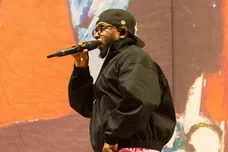"This another motherfucking rap song. Broke and crazy, rich and famous doesn't last long. Spent all my cash on a broken dream, went from weed and liquor to the coke and lean." - Mac Miller, "Polo Jeans."
Whether we like it or not, drugs are a massive component of hip-hop culture. No matter the drug, no matter the era, they've always played a major role for better or worse. The rap lifestyle has always gone hand in hand with drugs, partying, and everything that comes along with that. In some cases, it's harmless recreational drugs like marijuana that act as atmosphere enhancers, whereas harder drugs set the tone for gritty storytelling about troubled pasts and rough upbringings. In any case, these drugs all have a very distinct effect on the music that gets made around them, and the artists that make it.
A few days ago, we posted our dream smoke session scenarios with our favorite weed rappers. It goes to show how lighthearted the marijuana subculture within hip-hop is. It reflects the loosened legal status of marijuana in our country, and the ever-increasing openness with which we use the drug recreationally. As the social stigma against the sticky icky gradually fades away, the already weed-friendly hip hop industry will continue to embrace it fully and use it's newfound status to their advantage. Weed-driven rap music takes on the characteristics of the actual high caused by the drug, as weed rappers tend to make music that is laid back and very chilled out, from Snoop Dogg to Cypress Hill to Wiz Khalifa. The mellow high is only complimented by music that achieves the same feeling.
While marijuana is used mostly as a mood-enhancer in hip-hop, cocaine is a different story. Coke, or even crack, sets a much different tone, usually inspiring much darker, more gloomy music. Instead of being spoken of in a positive light like weed, cocaine is usually being talked about solely as a means to an end. Rappers are usually only talking about selling coke or crack in the past tense as a way of getting out of their current situation. They're in it for the business, rather than the pleasure aspect of it. Obviously, there's outliers and exceptions, but artists like Pusha T have carved out entire catalogs of music made up of metaphors and wordplay elaborately describing their former coke-selling escapades. It goes to show the difference between two drugs on two very opposite ends of the spectrum, as far as effect on the body, as well as effect on the music of their protagonists.
One of the more interesting cases of a drug phase in rap was molly. Originally a nickname for only the purest form of MDMA, molly evolved into an umbrella term that covered any and all rave drugs that came in powder, pill, and/or rock form, which is dangerous. The explosion in popularity paralleled the rise of EDM music in the mainstream, as well as hip-hop's somewhat short-lived fascination with intertwining the two genres. It seemed like for a solid year or so, artists were turning up off that molly pretty heavily and letting their music reflect their newfound hobby. Molly, if it's the real deal and not cut with harmful chemicals, is ok to mess around with once in a while, but can be extremely detrimental to the brain if use is sustained heavily over an extended period of time. Luckily, it's a phase that seems to have passed in hip-hop.
One phase that won't seem to pass is that of lean, also known as promethazine with codeine syrup. The drug, normally mixed with soda, alcohol, or both in a syrup mixture, has been around forever. The popularity of sipping lean started with UGK in the Houston rap scene in the late 1990s, and has only grown exponentially. Probably popularized most in the mainstream by Lil Wayne throughout the mid-to-late 2000s, lean got its nickname from the stance its users sometimes take when the drink gets a hold of them, sometimes putting them into a deep slumber. It's still widely used in the hip-hop community everywhere in the country, made visible in tons of videos, and talked about constantly in artist's lyrics. The problem is that it's a horribly addictive drug that has awful long term side effects, including severe brain damage and the risk of life threatening seizures. Thankfully, some of the game's most prolific users of lean have come out to speak against it in recent years, letting people know how painful the withdrawal symptoms are, and how it's affected their lives in negative ways. As far as the music, we have to thank the drug, as it helped birth subgenres like chopped and screwed, trap, and drill, which have all shaped how hip-hop music will be made for years to come. We just hope that artists now see that they can create these great styles of hip-hop music without getting hooked on the syrup.







